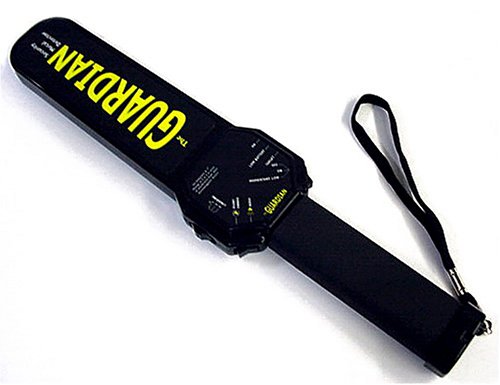
In China this year, 7 June was the day prospective tertiary education hopefuls sat down to take the national university entrance examination. It’s a high stakes affair that has a great impact on each young person’s future.
Given the pressure these students and their family face there’s no question some will resort to cheating to get through. This year alone 9,120,000 people will take the exam. Considering those numbers, even if the cheating rate is only 0.1 percent, there is still a serious problem.
Starting this year the government has begun clamping down further on the growing problem of entrance exam cheats.
The two most popular methods of cheating are hiring a ringer to take the test for the actual student, or using wireless communication devices such as hidden cameras and earpieces to communicate with outside supporters.
To combat imposters, every testing site has begun to use fingerprint scanners to verify the test takers identity. It’s a little hard to gauge the effectiveness of these scanners though as it would seem to require having all of nine million people’s fingerprints on record.
In searching for any hidden communication devices the government has brought out metal detecting wands that hopefully can sniff out hard to see ear pieces or cameras mounted in eye glasses.
Altogether these are said by authorities to be the strictest counter-cheating measures ever taken. Although the idea of pinning the future of one’s education practically on a single test, as is done in China, Japan, and South Korea, seems rather extreme to this writer, it’s good to see steps being taken to ensure a fair playing field.

 Eyes on your own paper! 1,200 Chinese students take test outdoors to prevent cheating
Eyes on your own paper! 1,200 Chinese students take test outdoors to prevent cheating Japanese rail company lets teens ride for free on super stressful entrance exam days
Japanese rail company lets teens ride for free on super stressful entrance exam days Five ways to trap your boyfriend into revealing that he’s cheating on you, and why they are dumb
Five ways to trap your boyfriend into revealing that he’s cheating on you, and why they are dumb Work-in-progress Japanese AI program could probably get into 474 universities in the country
Work-in-progress Japanese AI program could probably get into 474 universities in the country 31 percent of Japanese women admit to cheating on lover, six percent say they got caught【Survey】
31 percent of Japanese women admit to cheating on lover, six percent say they got caught【Survey】 McDonald’s new Happy Meals offer up cute and practical Sanrio lifestyle goods
McDonald’s new Happy Meals offer up cute and practical Sanrio lifestyle goods Tokyo Tsukiji fish market site to be redeveloped with 50,000-seat stadium, hotel, shopping center
Tokyo Tsukiji fish market site to be redeveloped with 50,000-seat stadium, hotel, shopping center Japanese ramen restaurants under pressure from new yen banknotes
Japanese ramen restaurants under pressure from new yen banknotes New private rooms on Tokaido Shinkansen change the way we travel from Tokyo to Kyoto
New private rooms on Tokaido Shinkansen change the way we travel from Tokyo to Kyoto Beautiful Red and Blue Star luxury trains set to be Japan’s new Hokkaido travel stars
Beautiful Red and Blue Star luxury trains set to be Japan’s new Hokkaido travel stars Sakura tree falls on man at Sannenzaka near Kiyomizu temple in Kyoto 【Breaking News】
Sakura tree falls on man at Sannenzaka near Kiyomizu temple in Kyoto 【Breaking News】 French Fries Bread in Tokyo’s Shibuya becomes a hit on social media
French Fries Bread in Tokyo’s Shibuya becomes a hit on social media Mt. Koya planning to instate visitor’s tax to cope with huge tourist numbers
Mt. Koya planning to instate visitor’s tax to cope with huge tourist numbers Non-ramen Ramen Restaurant Stars: The quest begins at Tokyo’s Oreryu Shio
Non-ramen Ramen Restaurant Stars: The quest begins at Tokyo’s Oreryu Shio We tried Korea’s way-too-big King Tonkatsu Burger at Lotteria 【Taste Test】
We tried Korea’s way-too-big King Tonkatsu Burger at Lotteria 【Taste Test】 All-you-can-drink Starbucks and amazing views part of Tokyo’s new 170 meter-high sky lounge
All-you-can-drink Starbucks and amazing views part of Tokyo’s new 170 meter-high sky lounge More foreign tourists than ever before in history visited Japan last month
More foreign tourists than ever before in history visited Japan last month Starbucks reopens at Shibuya Scramble Crossing with new look and design concept
Starbucks reopens at Shibuya Scramble Crossing with new look and design concept Studio Ghibli releases new action figures featuring Nausicaä of the Valley of the Wind characters
Studio Ghibli releases new action figures featuring Nausicaä of the Valley of the Wind characters Studio Ghibli glasses cases let anime characters keep an eye on your spectacles
Studio Ghibli glasses cases let anime characters keep an eye on your spectacles Is the new Shinkansen Train Desk ticket worth it?
Is the new Shinkansen Train Desk ticket worth it? Beautiful Ghibli sealing wax kits let you create accessories and elegant letter decorations【Pics】
Beautiful Ghibli sealing wax kits let you create accessories and elegant letter decorations【Pics】 Studio Ghibli releases Kiki’s Delivery Service chocolate cake pouches in Japan
Studio Ghibli releases Kiki’s Delivery Service chocolate cake pouches in Japan New definition of “Japanese whiskey” goes into effect to prevent fakes from fooling overseas buyers
New definition of “Japanese whiskey” goes into effect to prevent fakes from fooling overseas buyers Our Japanese reporter visits Costco in the U.S., finds super American and very Japanese things
Our Japanese reporter visits Costco in the U.S., finds super American and very Japanese things Studio Ghibli unveils Mother’s Day gift set that captures the love in My Neighbour Totoro
Studio Ghibli unveils Mother’s Day gift set that captures the love in My Neighbour Totoro Domino’s Japan now sells…pizza ears?
Domino’s Japan now sells…pizza ears? New Japanese KitKat flavour stars Sanrio characters, including Hello Kitty
New Japanese KitKat flavour stars Sanrio characters, including Hello Kitty New Pokémon cakes let you eat your way through Pikachu and all the Eevee evolutions
New Pokémon cakes let you eat your way through Pikachu and all the Eevee evolutions Sales of Japan’s most convenient train ticket/shopping payment cards suspended indefinitely
Sales of Japan’s most convenient train ticket/shopping payment cards suspended indefinitely Sold-out Studio Ghibli desktop humidifiers are back so Totoro can help you through the dry season
Sold-out Studio Ghibli desktop humidifiers are back so Totoro can help you through the dry season Japanese government to make first change to romanization spelling rules since the 1950s
Japanese government to make first change to romanization spelling rules since the 1950s Ghibli founders Toshio Suzuki and Hayao Miyazaki contribute to Japanese whisky Totoro label design
Ghibli founders Toshio Suzuki and Hayao Miyazaki contribute to Japanese whisky Totoro label design Doraemon found buried at sea as scene from 1993 anime becomes real life【Photos】
Doraemon found buried at sea as scene from 1993 anime becomes real life【Photos】 Tokyo’s most famous Starbucks is closed
Tokyo’s most famous Starbucks is closed One Piece characters’ nationalities revealed, but fans have mixed opinions
One Piece characters’ nationalities revealed, but fans have mixed opinions We asked a Uniqlo employee what four things we should buy and their suggestions didn’t disappoint
We asked a Uniqlo employee what four things we should buy and their suggestions didn’t disappoint Princesses, fruits, and blacksmiths: Study reveals the 30 most unusual family names in Japan
Princesses, fruits, and blacksmiths: Study reveals the 30 most unusual family names in Japan 6 surprising things about having a baby in Japan
6 surprising things about having a baby in Japan Japan has a cat aptitude test to show off how much you know about our feline friends
Japan has a cat aptitude test to show off how much you know about our feline friends How to use Japan’s new self-checkout supermarket carts
How to use Japan’s new self-checkout supermarket carts Social media users boast of plans to grope schoolgirls on day of Japan’s most important test
Social media users boast of plans to grope schoolgirls on day of Japan’s most important test Man kicked out of Japan’s national college entrance exam for improper mask-wearing technique
Man kicked out of Japan’s national college entrance exam for improper mask-wearing technique North Korea claims successful hydrogen bomb test, world very skeptical
North Korea claims successful hydrogen bomb test, world very skeptical Japanese ramen restaurants under pressure from new yen banknotes
Japanese ramen restaurants under pressure from new yen banknotes Head-mounted lie detectors: The cool new way to ruin your office Christmas party in Japan
Head-mounted lie detectors: The cool new way to ruin your office Christmas party in Japan Chinese manufacturers already hard at work making iPhone X misuse prevention tools
Chinese manufacturers already hard at work making iPhone X misuse prevention tools Twitter user exposes test-taking “geek” to the world, geek sees tweet and turns to confront him
Twitter user exposes test-taking “geek” to the world, geek sees tweet and turns to confront him The new fitness test that’s sweeping the Chinese net
The new fitness test that’s sweeping the Chinese net Students in Japan get free point on entrance exam because of typo, Internet says they got off easy
Students in Japan get free point on entrance exam because of typo, Internet says they got off easy Cosplay 3D Scanner Studio is a compact way to digitize your cosplay, free cosplayer trial planned
Cosplay 3D Scanner Studio is a compact way to digitize your cosplay, free cosplayer trial planned Most female doctors in poll can understand Tokyo medical school reducing female applicant scores
Most female doctors in poll can understand Tokyo medical school reducing female applicant scores
Leave a Reply